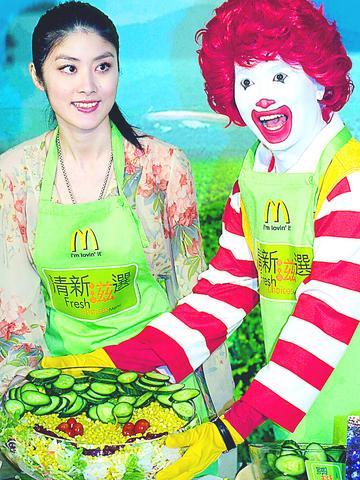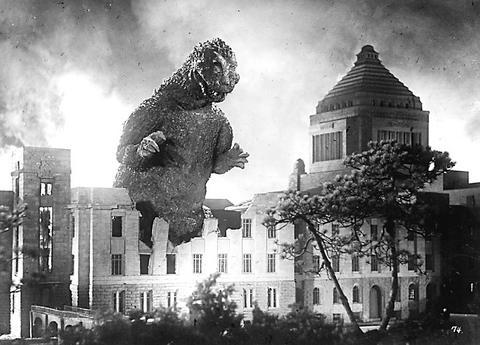Always one to speak candidly, if not always eloquently, Jackie Chan (
The official release party for Sun Yanzi's (孫燕姿) new album was held Wednesday at the Far Eastern Hotel in Taipei, the highlight of which was a sneak preview of an 8-minute film that's like the extended remix of the first video off the album for My Love (

PHOTO: AP
A final decree was issued last week by China's Ministry of Culture, which serves as the gatekeeper for publication imports, declaring that Alex To's (杜德偉) album Take it Off (脫掉) would be barred from distribution within the country. The album was released in July, but had been stalled by censors concerned about the propriety of the highly suggestive sexual tone of To's album. To's label, Rock Records, said in response, that it plans to package the album with other soon-to-be-released products in China. Pop Stop has heard from sources in China, though, that the album was out there long ago in pirate form and was pretty much already forgotten.

PHOTO: AP
Hong Kong singer/actress Kelly Chen (
Perhaps the most exciting news of the past week was the announcement that Godzilla will be awarded a star on Hollywood Boulevard. The nuclear monstrosity, who's often conflicted and always misunderstood by humans in his movies, will get to make his imprint in the pavement in front of the city's Chinese Theatre on Nov. 29, which will mark the world premiere of the 28th and last Godzilla movie Godzilla Final Wars. Before hanging up his rubber suit, in the last flick Godzilla gets to indulge in an orgy of city stomping, this time through Shanghai, Paris, New York and Sydney.

The primaries for this year’s nine-in-one local elections in November began early in this election cycle, starting last autumn. The local press has been full of tales of intrigue, betrayal, infighting and drama going back to the summer of 2024. This is not widely covered in the English-language press, and the nine-in-one elections are not well understood. The nine-in-one elections refer to the nine levels of local governments that go to the ballot, from the neighborhood and village borough chief level on up to the city mayor and county commissioner level. The main focus is on the 22 special municipality

The People’s Republic of China (PRC) invaded Vietnam in 1979, following a year of increasingly tense relations between the two states. Beijing viewed Vietnam’s close relations with Soviet Russia as a threat. One of the pretexts it used was the alleged mistreatment of the ethnic Chinese in Vietnam. Tension between the ethnic Chinese and governments in Vietnam had been ongoing for decades. The French used to play off the Vietnamese against the Chinese as a divide-and-rule strategy. The Saigon government in 1956 compelled all Vietnam-born Chinese to adopt Vietnamese citizenship. It also banned them from 11 trades they had previously

Jan. 12 to Jan. 18 At the start of an Indigenous heritage tour of Beitou District (北投) in Taipei, I was handed a sheet of paper titled Ritual Song for the Various Peoples of Tamsui (淡水各社祭祀歌). The lyrics were in Chinese with no literal meaning, accompanied by romanized pronunciation that sounded closer to Hoklo (commonly known as Taiwanese) than any Indigenous language. The translation explained that the song offered food and drink to one’s ancestors and wished for a bountiful harvest and deer hunting season. The program moved through sites related to the Ketagalan, a collective term for the

As devices from toys to cars get smarter, gadget makers are grappling with a shortage of memory needed for them to work. Dwindling supplies and soaring costs of Dynamic Random Access Memory (DRAM) that provides space for computers, smartphones and game consoles to run applications or multitask was a hot topic behind the scenes at the annual gadget extravaganza in Las Vegas. Once cheap and plentiful, DRAM — along with memory chips to simply store data — are in short supply because of the demand spikes from AI in everything from data centers to wearable devices. Samsung Electronics last week put out word